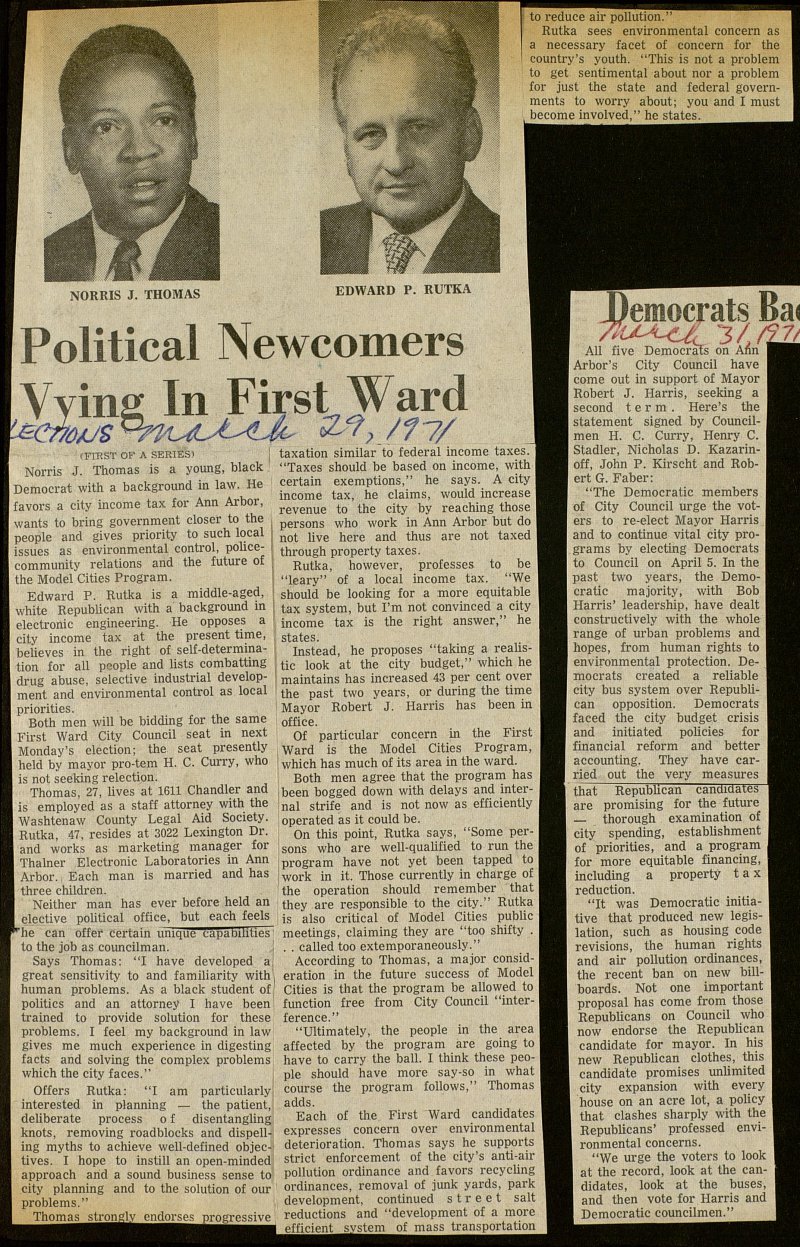Political Newcomers Vying In First Ward

Norris J. Thomas is a young, black Democrat with a background in law. He favors a city income tax for Ann Arbor, wants to bring government closer to the . people and gives priority to such local issues as environmental control, police community relations and the future of the Model Cities Program. Edward P. Rutka is a middle-aged, white Republican with a background in electronic engineering. He opposes a city income tax at the present time, believes in the right of self-determinaüon for all people and lists combatting drug abuse, selective industrial development and environmental control as local priorities. Both men will be bidding for the same First Ward City Council seat in next Monday's election; the seat presently held by mayor pro-tem H. C. Curry, who is not seeking relection. Thomas, 27, lives at 1611 Chandler and is employed as a staff attorney with the Washtenaw County Legal Aid Society. Rutka, 47, resides at 3022 Lexington Dr. and works as marketing manager for Thalner Electronic Laboratories in Ann Arbor. , Each man is married and has three children. Neither man has ever before held an elective political office, but each feels r"he can offer certain unique eapabiliues to the job as councilman. Says Thomas: "I have developed a great sensitivity to and familiarity with human problems. As a black student of politics and an attorney I have been trained to provide solution for these problems. I feel my background in law gives me much experience in digesting facts and solving the complex problems which the city faces." Offers Rutka: "I am particularly interested in planning - the patiënt, delibérate process of disentangling knots, removing roadblocks and dispelling myths to achieve well-defined objectives. I hope to instill an open-minded approach and a sound business sense to city planning and to the solution of our problems." Thomas strongly endorses progressive A - ' P f I t taxation similar to federal income taxes "Taxes should be based on income, with certain exemptions," he says. A city income tax, he claims, would increase revenue to the city by reaching those persons who work in Ann Arbor but do not live here and thus are not taxed through property taxes. Rutka, however, professes to be "leary" of a local income tax. "We I ; should be looking for a more equitable tax system, but I'm not convinced a city ; income tax is the right answer," he ' states. Instead, he proposes "taking a realisitic look at the city budget," which he maintains has increased 43 per cent over the past two years, or during the time Mayor Robert J. Harris has been in office. Of particular concern in the First Ward is the Model Cities Program, which has much of its area in the ward. Both men agree that the program has been bogged down with delays and interval strife and is not now as efficiently operated as it could be. On this point, Rutka says, "Some persons who are well-qualified to run the program have not yet been tapped to work in it. Those currently in charge of the operation should remember that they are responsible to the city." Rutka is also critical of Model Cities public meetings, claiming they are "too shifty . . . called too extemporaneously." According to Thomas, a major consideration in the future success of Model Cities is that the program be allowed to function free f rom City Council "interference." "IMmately, the people in the area affected by the program are going to have to carry the ball. I think these people should have more say-so in what course the program follows," Thomas adds. Each of the First Ward candidates expresses concern over environmental deterioration. Thomas says he supports strict enforcement of the city's anti-air pollution ordinance and favors recycling ordinances, removal of junk yards, park development, continued street salt reductions and "development of a more efficiënt system of mass transportation to reduce air pollution." Rutka sees environmental concern as a necessary facet of concern for the country's youth. "This is not a problem to get sentimental about nor a problem for just the state and federal governments to worry about; you and I must become involved," he states.
Article
Subjects
Ann Arbor News
Old News
Norris J. Thomas
Edward P. Rutka
3022 Lexington Dr
1611 Chandler